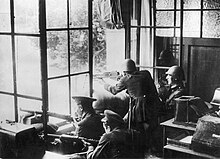Our website is made possible by displaying online advertisements to our visitors.
Please consider supporting us by disabling your ad blocker.
July 1936 military uprising in Barcelona
| Barcelona's 19 July military rising | |||||||
|---|---|---|---|---|---|---|---|
| Part of the Spanish coup of 1936 | |||||||
 Soldiers and Assault Guards entrenched in a building | |||||||
| |||||||
| Belligerents | |||||||
|
|
| ||||||
| Commanders and leaders | |||||||
|
|
| ||||||
| Strength | |||||||
|
5,000 men (Civil Guard, Police, Assault Guard, Mossos d'Esquadra) CNT Militia | 5,000 men | ||||||
| Casualties and losses | |||||||
| 200[1] | 300 | ||||||
The July 1936 military uprising in Barcelona was a mutiny that occurred in Barcelona, the capital and largest city of Catalonia, in the Second Spanish Republic from 19 to 21 July 1936. It was one of the main events that marked the start of the Spanish Civil War.
A group of officers of the Spanish Republican Army in Barcelona launched an uprising in support of the coup of July 1936. They were opposed by the Civil Guard, the Assault Guard, and the Mossos d'Esquadra which remained loyal to the Republican government, and the militias of the powerful anarchist trade union Confederación Nacional del Trabajo (CNT) that controlled much of Catalonia. Rebel troops led by Manuel Goded captured some strategic locations in the city but were defeated by Republican and CNT forces after one day of combat. Many leaders of the uprising including Goded were imprisoned and executed at Montjuïc Castle.
The defeat of the uprising in Barcelona was a great success for the Republic, but it became clear that the CNT and the anarcho-syndicalist militias in particular were the ones that really controlled the city. The mutiny marked the beginning of the Revolutionary Catalonia period and the Spanish Revolution of 1936, which resulted in the harsh repression against those suspected of being "fascist" or opposed to the revolution.
- ^ Thomas 2001, p. 237.
Previous Page Next Page


